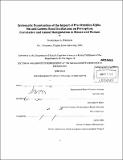Systematic examination of the impact of pre-stimulus alpha- mu and gamma band oscillations on perception : correlative and causal manipulation in mouse and human
Author(s)
Pritchett, Dominique L. (Dominique Leon)
DownloadFull printable version (10.94Mb)
Alternative title
Examining the role of ongoing alpha and gamma band oscillations on variability neural responses and behavioral performance in rodent barrel cortex
Other Contributors
Massachusetts Institute of Technology. Dept. of Brain and Cognitive Sciences.
Advisor
Christopher I. Moore.
Terms of use
Metadata
Show full item recordAbstract
The over-arching hypothesis that drives my work is that neural dynamics, fluctuating on millisecond to second time scales, powerfully impact perception. In this thesis, I employ correlative electrophysiological recording methods and causal optogenetic control of neural circuits to systematically test the importance of dynamics in the expression of pre-stimulus oscillations on perception. Specifically, I test the prediction that alpha oscillations expressed in a given sensory representation within a neocortical map predict diminished sensory capability in that region of sensory space, while gamma oscillations predict enhanced capacity. My model system throughout is primary somatosensory neocortex and tactile perception: I combine studies from human and mouse to benefit from the relative merits of each preparation. Several prior studies support this more generally stated view of oscillatory dynamics -- alpha predicting diminished and gamma predicting enhanced perceptual capacity. However, there is significant disagreement on even this broad assumption. Leading researchers have argued that alpha in fact predicts enhanced detection of tactile stimuli (e.g., Nicolelis and Fanselow, 2002). Further, there remains significant discord over whether gamma oscillations predict enhanced ability and, even if they do so, whether their expression is a causal contributor to this increased capacity or whether gamma is an epiphenomenal by-product of other beneficial shifts in neural dynamics. My thesis directly addresses these basic questions as to the predictive value of these oscillations, and favors the view that alpha and gamma are in general predictive of perception as stated. Further, I provide unique causal data showing that, under the conditions of our experiments, entrainment of a realistic and local gamma oscillation in neocortex can enhance stimulus detection. I also address important questions as to the independence of different frequency bands expressed in pre-stimulus oscillatory dynamics. Specifically, in contrast to prior reports, I provide evidence in humans and mouse that alpha and beta are unique in their expression and do not occur as a single coincident "mu" rhythm. I also provide direct evidence against the simplistic view-which has also been recently postulated-that alpha and gamma rhythms are inherently opposed in their expression (e.g., that increase in one is necessarily coincident with decrease in the other). Perhaps most importantly, while my data support the general view that alpha and gamma have opposing impacts on perception, I also show that there are more complex interactions between alpha and gamma in predicting perceptual success, suggesting that a simplistic view of each frequency as a 'state' is inappropriate, and that these oscillations are independent in their expression and potentially in their allocation to optimize perception, e.g., with selective attention. Our MEG results support the hypothesis that the alpha band oscillation is negatively correlated with perception. Further, using LFP in the mouse we observe that this alpha oscillation is a disengaging rhythm in rodents as well, contrary to prior work in barrel cortex in rats. More, we show that increased gamma power is correlated with perception of a liminal tactile stimulus. Then using optogenetic control of the fast-spiking interneurons, we causally entrain a gamma oscillation to show enhancement of perception.
Description
Thesis (Ph. D.)--Massachusetts Institute of Technology, Dept. of Brain and Cognitive Sciences, 2012. Cataloged from PDF version of thesis. Includes bibliographical references.
Date issued
2012Department
Massachusetts Institute of Technology. Department of Brain and Cognitive SciencesPublisher
Massachusetts Institute of Technology
Keywords
Brain and Cognitive Sciences.